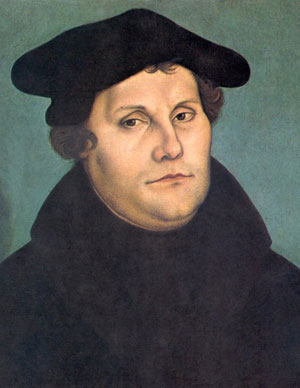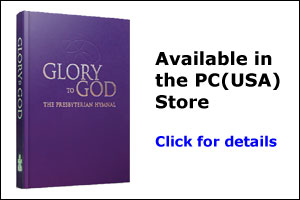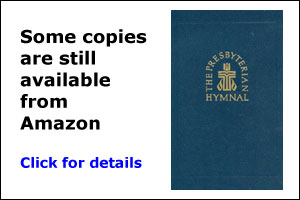
A Mighty Fortress Is Our God
#275 in Glory to God
#259 & #260 in The Presbyterian Hymnal
As you may already have learned, there are many hymns in the Bible. In fact, the whole book of Psalms is a hymnal. Unfortunately, we don't have a clue what the tunes of those songs would have sounded like. The notation we use in our hymnals and that musicians generally use today hadn't been invented when the psalms were originally written down. Even today, churches in different parts of the world sometimes use forms of musical notation different than what shows up in The Presbyterian Hymnal or in our Glory to God hymnal.
Not every Christian thinks of the same tune or style of music when they think of the words of a specific hymn. Yesterday, among our Camp Songs, we sang along with the Lifetree Kids version of "Amazing Grace." That version is joyful, bouncy, and fun to dance to. That tune helps us feel the joy of being a forgiven child of God. I love that happy, joyful version.
But then, also on Wednesday, we listened to a different version of "Amazing Grace" sung by a choir and congregation accompanied by a powerful organ. At times the organist in that video even used the organ to mimic the voice of a bagpipe to remind the congregation of the Scotch-Irish associations with "Amazing Grace" and its introduction into the American South. I don't think of dancing when I hear that version. In fact sometimes the choir and organ version makes me cry a little bit—not out of sadness, but because it reminds me of how much God loves me. I don't want to dance, but to stand perfectly still overwhelmed by thanksgiving, joy, and love. I really love both versions, but with different parts of my heart.
If you listen closely, you may realize that these two very different versions of "Amazing Grace" actually use the same tune, but the musicians who arranged it expressed that simple tune into very different musical styles. Composers and arrangers reach into their own spiritual life and experiences to create or adapt tunes that teach the message of a hymn just as the words of the poet do. It's only logical that when a spiritually aware composer reads a poem about God's love she begins to imagine a tune that harmonizes with the words of the poem. The words and the tune together become a song.
In the 1500s, Martin Luther read a Hebrew poem written probably when Solomon was the king of Israel. We know that poem as Psalm 46. Luther loved it. The Hebrew words touched him and reminded him that God was protecting him and delivering him from powerful men who wanted to kill him. Luther read the words of the first verse,
אֱלֹהִים לָנוּ, מַחֲסֶה וָעֹז
עֶזְרָה בְצָרוֹת, נִמְצָא מְאֹד
He wanted to share these words of assurance with his friends, but since his friends couldn't read Hebrew, Luther translated this verse into German. But that still wasn't enough to move the hearts of his friends and neighbors. Luther smoothed the German words of his translation into a poem and then wrote a tune that also expressed what Psalm 46 had originally touched in his heart. Luther wrote,
Ein' feste Burg ist unser Gott,
ein' gute Wehr und waffen;
Still later, in the 1800s, Frederic Henry Hedge, an American minister, translated Luther's words into the English poem that begins,
A mighty fortress is our God,
A bulwark never failing:
Different writers, different languages, different words, even different millennia; but still the same testimony that God is our protection. We have no idea how the priests in Jerusalem would have sounded when they sang this psalm when it was first composed. In fact the original tune may have been quite different from how Psalm 46 was sung in the second temple about 900 years later when Jesus would have heard it.
The music Luther originally composed for Psalm 46 in the 1500s was a bit different than how we usually sing it today. Many people find the irregular rhythm of Luther's tune hard to sing, most congregations sing only the "evened out" version that's in our Glory to God hymnal. Luther's original tune and rhythm (with Frederic Hedge's English words) are hymn #259 in The Presbyterian Hymnal.
In the video below, the organist mixes a few lines of Luther's irregular rhythm into his introduction and the choir sings verse three in the original rhythm. I like this mixing because it reminds me that this hymn has a history. The organist and choir remind me of all the people who wrote, translated, composed, and versified Psalm 46. It reminds me that I'm not the only believer who has needed to sing, or needed to hear this hymn.
Psalm 46 has been a true testimony of God's protection and deliverance for almost 3000 years. I hope it will encourage your heart as well.
Never forget that God loves you, and so do I.
Stu Smith
The Text
A mighty fortress is our God,
a bulwark never failing.
Our helper he, amid the flood
of mortal ills prevailing.
For still our ancient foe
does seek to work us woe.
His craft and power are great,
and armed with cruel hate,
on earth is not his equal.
Did we in our own strength confide,
our striving would be losing,
were not the right man on our side,
the man of God's own choosing.
Dost ask who that may be?
Christ Jesus, it is he.
Lord Sabaoth his name,
from age to age the same,
and he must win the battle.
And though this world, with devils filled,
should threaten to undo us,
we will not fear, for God has willed
his truth to triumph through us.
The Prince of Darkness grim,
we tremble not for him.
His rage we can endure,
for lo, his doom is sure.
One little word shall fell him.
That word above all earthly powers,
no thanks to them, abideth.
The Spirit and the gifts are ours
through him who with us sideth.
Let goods and kindred go,
this mortal life also.
The body they may kill;
God's truth abideth still.
His kingdom is forever.
Martin Luther, 1529.
The Hymn
A Version for This Pandemic

From the Rev. Stu Smith: My first visit to Camp Carew was when I came under care of the Presbytery of Southeastern Illinois at a meeting held at camp in 1987. I was ordained and served in Chicago for over 25 years. I received my Doctor of Ministry Degree from McCormick Theological Seminary in 2001 with a concentration in Religious Education. My doctoral thesis was Out of the Church Basement and into Cyberspace: Internet-Based Religious Education for Youth.
In 2014, I moved back to my family farm in Vermilion County. I'm very proud to be associated with Kemmerer Village and Camp Carew and the powerful ministry with young people that they provide.

Camp Carew welcomes campers from all religious traditions.
Camp Carew is a drug- and alcohol-free environment.



